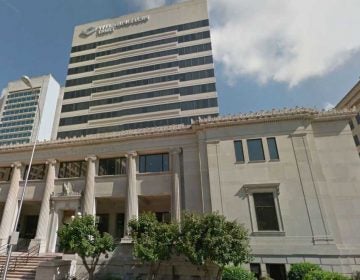Defense attorneys in Wilmington Trust case say loan extensions were not illegal
Closing arguments continued Tuesday during the seventh week in the trial of four former Wilmington Trust executives accused of bank fraud.

Wilmington Trust (File photo)
Closing arguments continued Tuesday during the seventh week in the trial of four former Wilmington Trust executives accused of bank fraud.
Defense attorneys argued that financial documents and emails presented in the trial prove their clients were acting in “good faith” in how they handled overdue loans.
“It’s not a crime to be wrong. It’s not a crime to have bad business judgment. It’s not a crime to be understaffed. It’s not a crime to be behind in your paperwork,” said defense attorney Michael Kelly, who represents defendant Robert Harra. “You can make an honest mistake in good faith. That is not willful intent or knowing.”
Harra, David Gibson, William North, and Kevyn Rakowski are accused of hiding millions in bad loans on the bank’s books from the Federal Reserve, the Securities and Exchange Commission, and the public between October 2009 and November 2010.
Prosecutors claim the four schemed to hide the true volume of losses. By the end of 2009, the bank reported just $11 million in past-due loans while waiving more than $360 million worth, prosecutors allege. They contend the bank never disclosed its financial circumstances to investors.
In October, Wilmington Trust reached a $60 million deal with the U.S. attorney’s office to settle criminal charges against it.
During the recession, many of the banks’ commercial clients, such as home builders and developers, were struggling to pay off their loans. In order to portray a solid loan portfolio, prosecutors have argued, the executives created “two sets of books.”
When the waiver practice became “overwhelming,” the defendants created a “mass extension process” of temporarily extending loans on a short-term basis, prosecutors said.
In less than two months, the bank allegedly extended about 800 loans worth more than $1.3 billion. Prosecutors argue some borrowers didn’t know their loans had been extended.
On Tuesday, the defense argued Wilmington Trust was a “relationship bank,” with a commitment to helping long-term customers.
They say the bank’s employees believed it was in their customers’ best interest to work with them during the economic crisis — so long as they continued to pay interest—in an effort to prevent foreclosures or other financial hardships.
They also argued financial statements and emails between dozens of employees, the Federal Reserve and auditors openly addressing the issue of waived loans and short-term extensions prove their practices were not concealed.
The defense argues the waiver practice had been in place for 28 years, and there’s no evidence anyone informed the defendants it was illegal. More than 100 individuals knew about the practice, including the bank’s lawyers, Kelly argued.
“Nobody says, ‘Hey this is illegal. This is not the way to do it. Sure, there’s people saying, ‘Is there a better way to do it?’ But just because there’s a better way to do it doesn’t make it a crime,” he said.
North’s attorney David Wilks pointed to an email between his client and other employees that includes a spreadsheet detailing matured loans. When another employee suggested the auditing group KPMG may want to review the document, North did not warn her against it, but asks another employee to email her the spreadsheet.
“It shows candor, it shows honesty, it shows transparency,” Wilks said.
The defense attorneys argued that documents introduced by the prosecution were presented out of context to mislead jurors.
“(The prosecution) take bits and pieces, a paragraph here, a sentence there. Put it in the oven and guess what comes out? A conspiracy,” Wilks said. “Are these people perfect? They’re not perfect. But not being perfect is not crime.”
The defense also points to a 2002 guidance from the Office of the Comptroller of the Currency stating a loan would not be past due if management has “restructured or extended a loan, formally or informally,” and that an informal extension is when the bank “accepts interest payments until the property is rented or sold.”
Prosecutors have focused on a section of the text stating extensions should be “for a limited and reasonable time and the bank should get the extension in writing.”
Throughout the trial, defense attorneys contended loans are not considered past due if interest is being paid.
“Once they were extended they were no longer past due. That’s why the numbers are wrong,” said defense attorney Kenneth Breen on Tuesday. “(Prosecutors) want to rewrite history.”
The defense also focused much of the blame on Joseph Terranova, who they call prosecutors’ “star witness.”
In 2013, Terranova pleaded guilty to conspiracy to commit bank fraud, and is currently awaiting a sentence. Documents used by the defense claim the former loan officer was responsible for 50 percent of the bank’s waived loans.
Breen calls Terranova a “serial liar.” He also said his CFO client certified financial statements in “good faith” based on his trust in the process and policies of the bank, and its employees.
Defense attorney Wilks showed jurors a 2009 email from Bill North to Joseph Terranova and Brian Bailey, who also pleaded guilty to related charges, asking if they were aware of borrowers’ projects having material vacancy and cash flow issues.
Bailey replied “none that I can recall,” while Terranova replied, “our commercial clients tell us they’re doing okay.”
“Bill North was counting on these people, and they were telling him everything seems okay,” Wilks said.
Closing arguments from the defense will continue on Wednesday.
—
Disclosure: Wilmington Trust supports WHYY.
WHYY is your source for fact-based, in-depth journalism and information. As a nonprofit organization, we rely on financial support from readers like you. Please give today.




